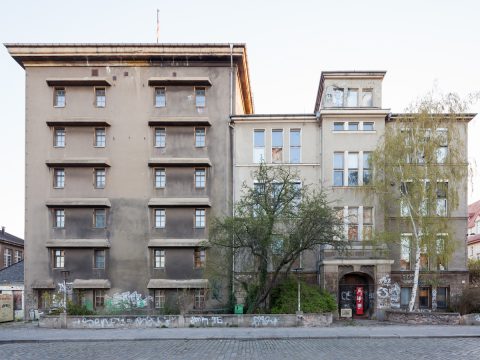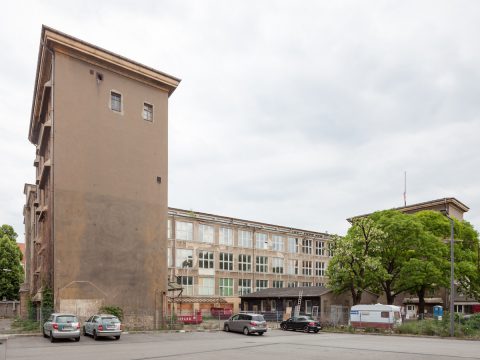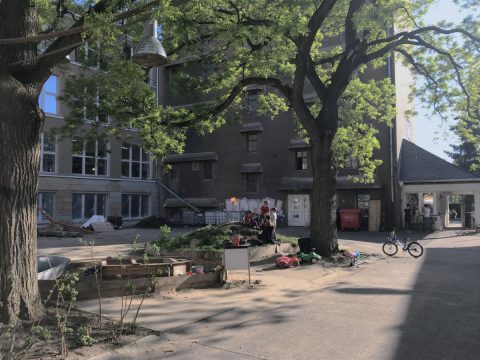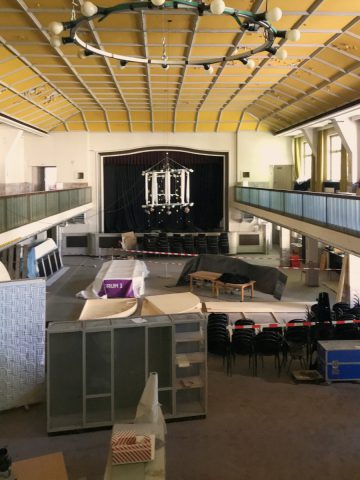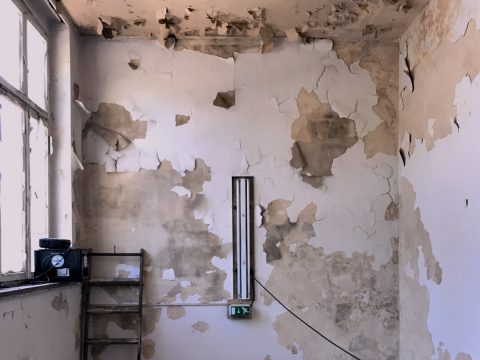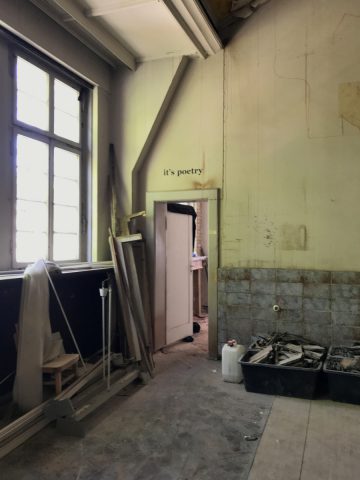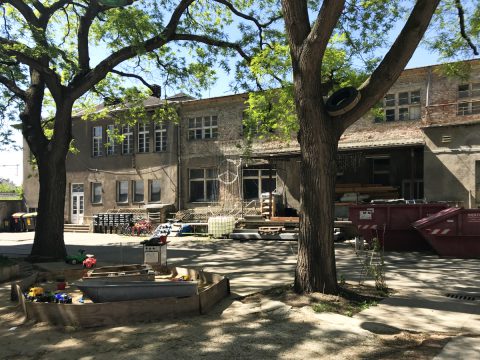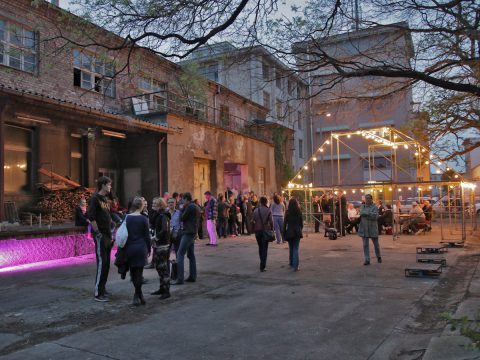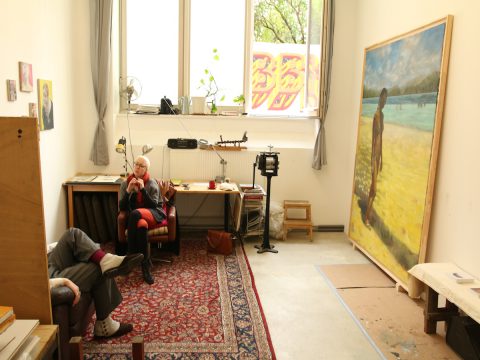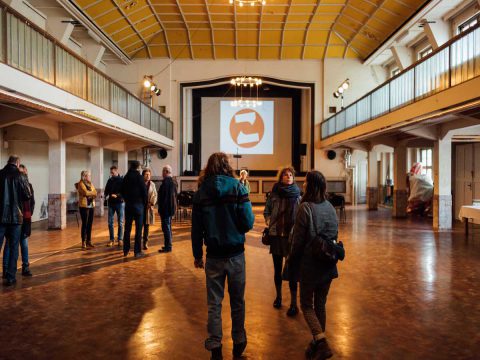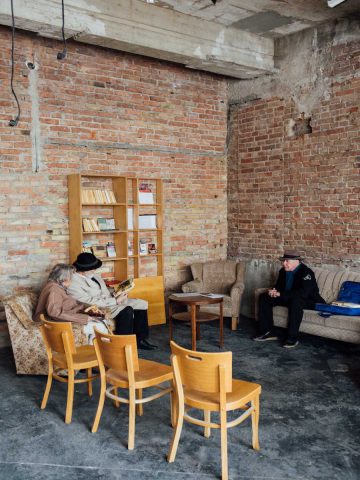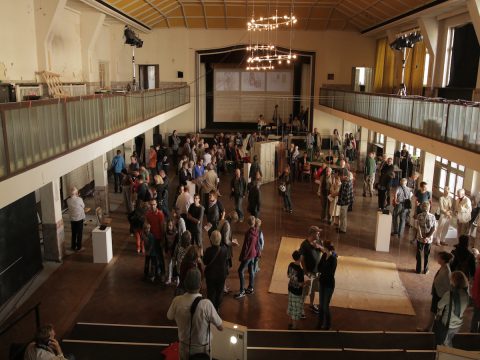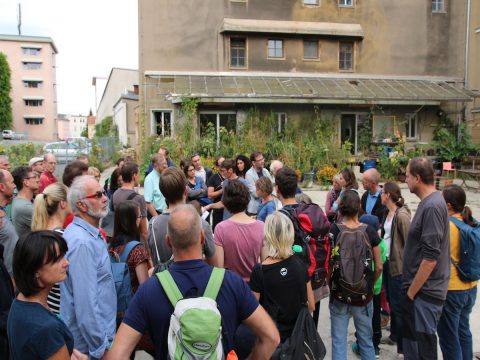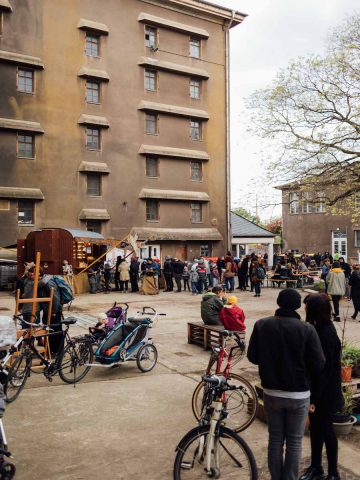Zentralwerk
20. April, 2018
(Dresden, GER)
Zentralwerk is a Dresden-based cooperative that acquired a former factory building (approximately 7,000 square metres), where it provides affordable space in the city that allows people to combine working, living, arts and culture.
Zentralwerk was founded in 2013 and grew out of a cultural association with the goal of securing free space for artistic and experimental practices. One-third of the approximately 7,000 square metres of the factory has been turned into living space for the cooperative members while the remaining two-thirds of the space is rented out as studios, commercial space, exhibition space and space for art production.
The rent for these spaces is not profit oriented but cost covering and aimed at ensuring a long-term perspective for cultural workers, which is increasingly rare in an emerging city. The Zentralwerk cooperative consists of 40 members with their 15 children, and it rents out work-space to approximately 150 users, such as visual and performance artists, photographers, architects, and theatre groups as well as a dance school, an independent radio station, and so on.
The overlap of the living and working areas is a central component of the project. It aims at bringing into contact private and professional, art and everyday life, so that the resulting network between different disciplines and age groups can continue to grow in an environment that is characterised by exchange, heterogeneity and cooperation.
Zentralwerk is self-organised and based on the voluntary work of its cooperative members who currently think about how to engage the other users not only to share the work-load but also to create a wider sense of community amongst everyone. Also wanting to foster further interconnections amongst the local residents and openness towards Dresden, Zentralwerk has established a Späti (that is, a mixture between a late shopping area and a meeting place) that serves as an interface to Zentralwerk’s social environment. Currently, members of Zentralwerk are also working on turning an old ballroom on their premise into an event space that serves as a non-curated platform for cultural production and is open to the public.
We met Barbara Lubich, co-founder of Zentralwerk and asked her to talk about Zentralwerk’s history, its present and the desirable futures it might carry…
https://vimeo.com/327465893
Translated transcript of this interview:
Tell us something about this place here.
We are at the Zentralwerk … Originally, it all did not start here on site, but in another district of Dresden, namely Friedrichstadt on the other side of the river.
We had lived and worked there for eight years on the premises of a former factory building. These were commercial premises, and we could stay there for €1.50 per square meter. There was nothing there. We built everything up from scratch, including the heating.
Nobody there really had a plan. Various people came and stayed. While being, living and working there, we got to know each other and became a collective. There were all sorts of people: artists but also event technicians, humanities scholars, dancers, psychologists and crafts people—it was a wild mixture. We were really diverse, and we always seemed to meet in the staircase and outside on the premises. At some point, we started doing events just because we wanted to give it a try.
And then the idea emerged to contribute to the Tanzwoche Dresden. It’s an annual festival. We had some sort of open house—but as a party. Everyone presented what they were working on and we named it “Sichtbetonung” [German wordplay, roughly translatable as: exposed concretisation]. That was in 2006 and it was very nice from the beginning.
And then we founded an association and presented ourselves as an institution. We also gave ourselves a motto: “The preservation of free space for art”. And then it really took off.
We rented the parking lot of the site, and paid to do cultural events there every Friday for more than a year. That’s how we won the Förderpreis der Stadt Dresden [City of Dresden Sponsorship Award] in 2013. And after we had won the prize, it was over because the owners said “goodbye” [laughs] and we had to leave.
From that moment on we thought, “Ah, it’s important that we go on”, because that was also the reason why we got stuck in Dresden; that was a place where we could do all kinds of things. And if this construct, this connection, to other people is lost, then the connection to Dresden is also lost. That’s why we said, “Okay”. There were 10 of us and we wanted to look for a new place.
We were looking for a new site. We visited two and developed concepts. We wrote down our self-image as a cultural association—at the time our name was “Friedrichstadt Zentral”— and developed an utilisation concept. This is how such things become concrete. It was clear that we wanted to combine living, working, culture and art in order to preserve this open space, and then we discovered this site [which is today Zentralwerk]. It was far too big; that was clear: it was way too big for 10 people anyway. But when you experience the size, like when you enter the event hall, for example, you think “Aaaah, great!” You can imagine all sorts of things in there. So, we said: “Okay, we will expand the group and try that”.
Who are the various actors at the Zentralwerk and how do they meet?
There are very different people here. On the one hand, there are the members of the cooperative who live and work here and have a friendly relationship, of course. But there are different groups. You meet to work, mainly to work [laughs] because we are still renovating and because we have to invest a lot of time in self-organisation and self-administration. And there are synergies with the people from the studios. The people got to know each other and are now starting to do things together. People are aware of each other being there, so the short distances lead them to working together. And that was also the idea—when you live or work side by side, you have more to do with each other.
The rental has been organised by a few people who kept an eye on having a good mixture of arts and other uses. They make sure that the people who get a room really need it and that it’s cheap. We didn’t put the focus on high-end creative industries, but rather on artists who couldn’t afford studios anymore because they’re too expensive. That was more our target group. And they make sure that the artists have a basic understanding of the project, in other words, we notice during the discussion whether the artists liked our vision and could imagine helping or participating. It was a bit of an attempt to curate the whole thing.
If a group of people provides a room, the impression is, “This is a space that I rent; they are my contacts, so they provide services in the programme”. And that’s not how we imagined it to be [laughs]. For making space available, we figured that the tenants would also have to return some commitment to make the place possible at all. This concept of self is not something that can be taken for granted but must be practised again and again. And that’s what we’re doing right now, trying to activate tenants as tenants. There is a communication platform between tenants and then there’s the newsletter from the cooperative, which is aimed at members but also at tenants. So, all of us understand ourselves as Zentralwerker.
We have a corner shop at the entrance and that’s the best thing that could happen at this place, because it’s a meeting place for tenants and members, but also neighbours. Among the neighbours are people who have been coming here every Saturday for two months now. They simply spend their Saturday here [on the construction site] in dust clouds to say, “Ha, I’m part of it”, or, “This a good thing, I need some balance anyway.” Great. That’s exactly what’s so cool about realising that people understand what this is all about and what it means to work. And we really need a lot of them.
What’s the most valuable thing about this place?
Good question. Well, that it is a self-determined place of exchange. Self-determination is a very important value here and so is free experimentation—these are the two main things. If that’s not the case anymore, we can close it down. Also, the Zentralwerk is not predictable. This has disadvantages [laughs], but it’s also nice.
Zentralwerk is also an independent place. That’s also something people don’t expect when they come here. Places of its magnitude aren’t usually privately owned. But it’s a private thing that simultaneously creates a public sphere. It’s a cluster; it creates a critical mass. As such, it works on its own. As an initiator, you don’t know what you have triggered. You can’t control it, you don’t want to control it, and that’s what I like very much. If you think about your role as an initiator, you can say, “Okay, I was an initiator, but that doesn’t mean that I need to control it all the time.”
It is good that different generations are among us. I told you that we first were 10 and then grew to 30. Then the children joined us and now there are also the tenants. And then maybe a member left but someone new joined. It’s incredibly important that this new energy comes in, because you need someone who has a fresh approach, so they can make up for someone who’s feeling low. But, of course, there are times when we’re really overwhelmed.
There are some of us who have concentrated so much on the project that they jeopardised their own work. Making your mark doesn’t get you anywhere here, you know. If you’re just thinking about getting ahead personally, then you’re in the wrong place here. We have different values here. My understanding of art or the concept of art includes that you understand its social relevance and also know the limits of art as mere self-stylisation. I’m simply not interested in the latter. To trigger a discourse that goes beyond the purely artistic is what makes it interesting to me.
We visited Barbara at Zentralwerk together with Sheena McGrandles who – at that time – ran Agora in Berlin. Barbara and Sheena shared their experiences, their hopes and challenges in a conversation.
